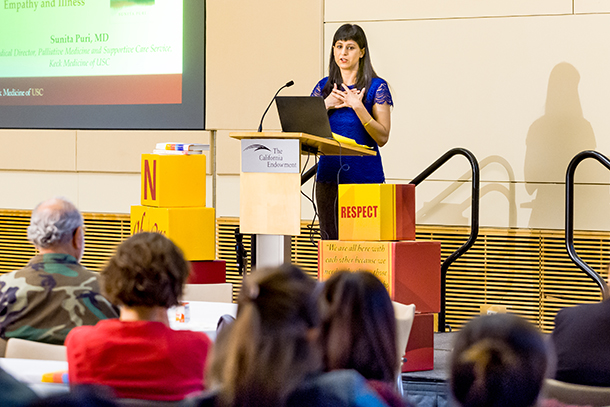On the morning of April 29, visitors to the California Endowment Center were greeted by a sign reading, “Improved quality of care has become a priority issue in the American health care system. What do you contribute?”
Below the sign in multi-colored, handwritten scrawl were phrases such as, “Build systems that prioritize safety,” “Listen to the patient and involve them in decisions,” and “Be present at all times.”
Examining the current and future state of patient-centered care was the focus of the fourth annual USC Choi Family Patient-Centered Care Symposium. The event is one element of the USC Choi Family Excellence in Patient-Centered Care Endowment established in 2016 by Keck Medicine of USC through a generous contribution from the Choi family. The endowment also includes a patient-centered care program and an annual awards ceremony.
“This symposium ensures that the culture of service and patient advocacy that exists today will be supported and enhanced now and in perpetuity,” said Char Ryan, chief patient experience officer for Keck Medicine of USC. “By working together, each of us can achieve the person-centered promise necessary to providing compassionate care to our patients and their families.”
The daylong seminar attracted Keck Medicine of USC staff members, as well as health care workers and patients throughout Southern California. Panel discussions covered a wide-range of topics, including relationship-based care, moral distress and its impact on patient safety, and finding resilience in the face of cancer.
“The Choi Symposium provides a crucial space to reflect on and consider how we can improve a culture of service and advocacy, both of which are central to taking excellent care of patients,” said Sunita Puri, MD, assistant professor of clinical medicine at the Keck School of Medicine of USC and medical director for palliative care at Keck Medical Center of USC.
As the keynote speaker, Puri read from her recently published memoir, “That Good Night,” and discussed the complex role language plays in promoting empathy among patients.
“Sometimes we can actually best exercise empathy in silence,” Puri explained. “I think that using words carefully, compassionately and concisely is key in communicating with patients, but so is the genuine desire to sit in silence and listen to what they have to say about their lives, their disease and what they hope for.”
The forum concluded with a presentation by Kaitlin Alderete, MHA, director of patient experience at Keck Hospital of USC and Joseph Vega, patient advocate and cancer survivor. The two showcased how nursing communications can be improved through the participation of patient and family advisors.
“When a patient and family are perceived as being part of the care and not something the care is being given to, there is a big difference in patient satisfaction,” Alderete said. “We have amazing nurses, physicians and teams that do this every day and the patients feel it. This symposium brings our community together and the focus on what it means to be patient and family centered. The more we talk about it, the more our culture and community is influenced by patient-centered care practices.”
Next year’s symposium is scheduled for April 27, 2020, and again will take place at the California Endowment Center.
— Matthew Vasiliauskas


